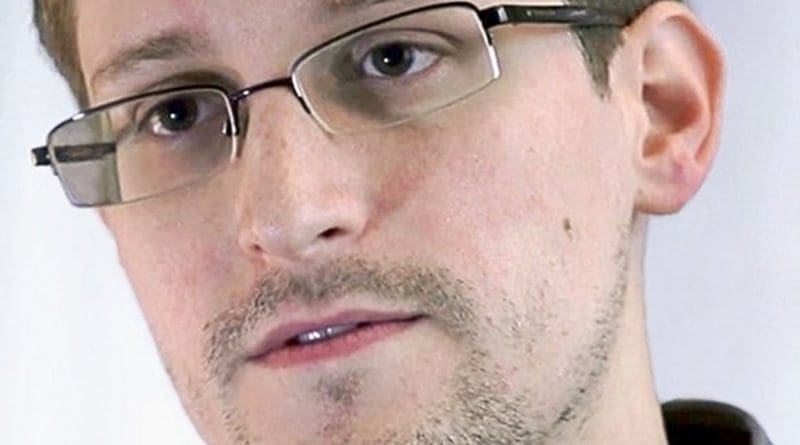To Defect Or To Integrate? Edward Snowden’s Dilemma – OpEd
Russia’s granting asylum to Edward Snowden is not just a milestone in US-Russia relations. It is a mene tekel of “How the United States is Repeating the Mistakes that Destroyed the Soviet Union”.
This was the topic that Russia Experts Panel discussed on the initiative of Martin Sieff of The Globalist at its inception a year ago. The Panel members refuse to yield to the russophobia of US mass media as they offer dissident views of world affairs.
The Panel was created by Edward Lozansky, a former Soviet nuclear scientist and dissident who broke with the USSR by applying for an Israeli visa and then settling in the USA with his family in spite of Soviet threats and annoyance.
Now Lozansky, who lives in Washington, writes about US vs Snowden: “Forty years ago, Soviet authorities brought the same accusation against the “gulag whistleblower” Alexander Solzhenitsyn”.
Lozansky asks: “Will there be a time… when the White House and Congress will forgive (Edward) Snowden …and change their attitude toward him (as) the Russian authorities changed their attitude toward Solzhenitsyn?”
Alexander Solzhenitsyn (1918-2008) was the Nobel Prize winning Russian novelist expelled from the USSR for describing it as an ideological expansionist state. While professing its love for “peaceful co-existence” with “capitalist” countries, Soviet government did everything to undermine them. At home it refused to co-exist even with its own dissenting citizens.
As a former Soviet defector and the author of Soviet Defectors: The KGB Wanted List, I wanted my native Russia, as well as my adoptive country, prosper in liberty, peace, and universal respect. Alas, since the collapse of Communism, the USA yielded to hubris of triumphalism and set itself on a course that is contrary to the precepts of its Constitution.
Snowden is not a Solzhenitsyn. But he is a man of conscience. His concern for the health of his country drove him to do what he did. No wonder, about half of American people admire him as a hero.
My research on Soviet defectors has shown that overwhelming majority abandoned their country, at a huge personal risk and for uncertain future, as a matter of conscience. They wanted to think for themselves, not bend their conscience to the dictate of the All-Mighty State and its Global Communism Ambition.
Among the hundreds assembled in my book, several defectors testified that, in making their fatal decision, whether it involved military intelligence or not, they were guided by conscience. In fact, one of them, Nikolai Khokhlov (1922-2007), wrote a book titled In the Name of Conscience («Право на совесть»).
A trained NKVD officer, Khokhlov proved his bravery and patriotism in a guerrilla team assassination of a Nazi governor of Belorus. But in 1954 Khokhlov balked at the order to assassinate an expatriate Russian in Berlin. He knew his refusal could be fatal, and defected to become US citizen and psychology professor. After the fall of the USSR, Presdent Boris Yeltsin pardoned him and he was allowed to return to Russia.
Soviet government’s failure to accommodate different worldviews inside the USSR resulted in a hemorrhage of talented and patriotic Russians. Some of them, most notably Solzhenitsyn whose books were best-sellers in the West, greatly contributed to the preservation of peace and freedom in the world.
In 2010 Jack Matlock, the distinguished former US ambassador to the USSR, published Superpower Illusions: How Myths and False Ideologies Led America Astray–And How to Return to Reality. Lately, even former President Jimmy Cater went on record as saying that the USA “no longer has a functioning democracy”. Had US leaders, both in the government and media, honestly pondered about serious implications of such pronouncements by seasoned diplomats and politicians, they would have been less rush in condemning Snowden.
An earnest effort at introspection is a must for the nation. A country that fails to integrate citizens of different ideological persuasions is bound to disintegrate.
W. George Krasnow (also published as Vladislav Krasnov), Ph.D., runs the Russia and America Goodwill Association, a non-profit organization of Americans for friendship with Russia. Formerly, he was a professor and director of Russian Studies at the Monterey Institute of International Studies in California.
Under the name of Vladislav Krasnov he published three books: “Solzhenitsyn and Dostoevsky: A Study in the Polyphonic Novel” (University of Georgia Press, Athens, GA, 1979), “Russia Beyond Communism: A Chronicle of National Rebirth” (Westview Press, 1991) and, “Soviet Defectors: The KGB wanted List” (Hoover Institution Press, 1985)
His op-ed columns have appeared in The Wall Street Journal, New York Times, San Francisco Examiner, San Diego Union, and Dallas Morning News. Articles, signed W. George Krasnow, can be found in The Moscow Times, Johnson’s Russia List, Russia Blog, Russia: Other Points of View, OpenDemocracy (UK) and a number of Russian-language outlets.
Krasnow endeavors to overcome considerable cultural misapprehensions that lead to war, hinder globalization or else distort it into cultural imperialism. He regards Russia as an unique civilization that has both European and Eurasian features.

